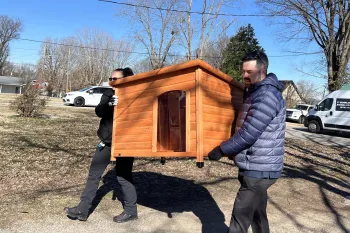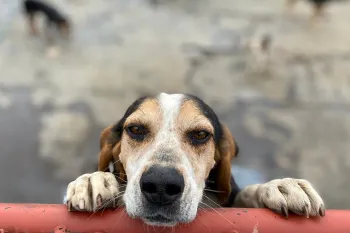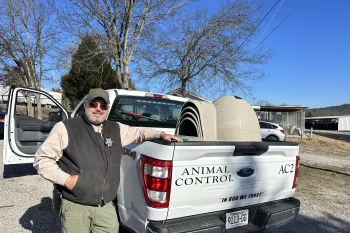The wellbeing of animals is often inextricable from the wellbeing of people, so in the spirit of bolstering both families and the pets they love, our team recently donated 60 high-quality outdoor dog shelters to communities in Bowling Green, Kentucky. We are getting ready to do the same in Marshalltown, Iowa, later this week.
The act of giving a dog shelter to a family that needs it seems simple, but there is a complex framework involved. On the one hand, we believe that everyone should be able to experience the joys and love that having a pet can bring. At the same time, we believe that animals are deserving of protection, and that means setting standards regarding how they are treated and the comfort that should be provided to them, especially during extreme cold or heat.
It is also essential that people understand that a dog’s fur does not fully insulate them from cold; dogs must have access to shelter and shade to regulate their body temperature. While it’s never ideal to leave a dog outdoors for long periods of time in extreme weather, whenever dogs are living outside they should have access to a sturdy, enclosed structure with bedding such as straw or shavings for warmth, a solid, raised floor that protects them from cold, precipitation and wind and provides shade from direct sun in the summer months.
What happened in Kentucky shows the creative problem-solving of our teams at work. In December, with our support, the city of Bowling Green passed a new ordinance requiring adequate shelter for dogs within the city limits. Then we worked with the city to provide top-of-the-line cedar dog shelters in circumstances where they’re needed most.
Last week, our team joined city and state officials in Bowling Green to celebrate this initiative an distribute dog shelters to community members who otherwise do not have the means to provide adequate shelter for their pets. The rest of the shelters will be distributed in the coming weeks.
“These are way better than what Snoopy had,” said Kentucky Secretary of State Michael G. Adams, who joined the Bowling Green event.
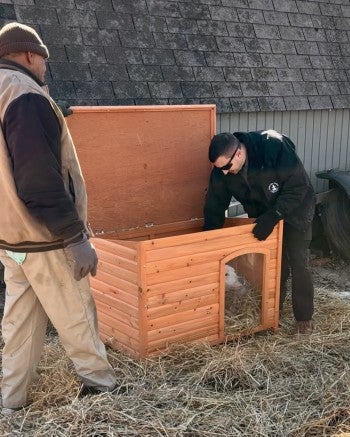
Todd Blevins/The HSUS
In Iowa, the animal neglect code was updated in 2020 to include definitions for outdoor housing for companion animals. The City of Marshalltown and the Animal Rescue League of Iowa (which will distribute donated doghouses starting this week) are actively working to ensure that Marshalltown residents are familiar with the law and to support residents with pets in providing adequate shelter that is suitable for Iowa winters.
This initiative is about more than free doghouses—it’s about raising awareness of what dogs need and helping people who care about them provide it. It’s about showing care and compassion for animals and the people who love them, and it’s about aligning our work on access to care with the establishment of humane policies. When a new law on adequate shelter was implemented in Tennessee, we led a similar effort to provide shelters for people who needed to comply with its standards.
Nationwide, our Animal Cruelty campaign and State Affairs team are working to clarify and define the elements of adequate shelter for dogs who live outdoors. Dogs can suffer from frostbite, and hypothermia or heat stroke, both of which can be fatal. A clear definition allows residents and law enforcement officers to understand exactly what is required for the welfare of a dog who primarily lives outside.
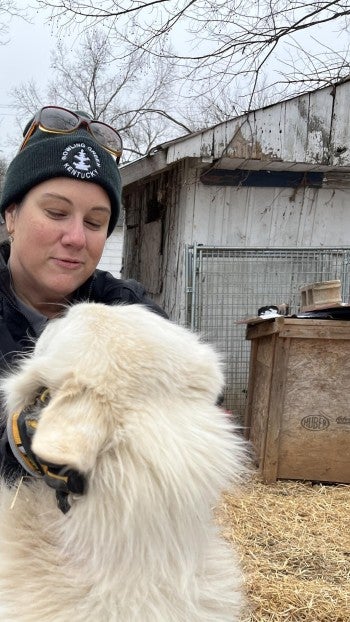
Brad Schargorodski/City of Bowling Green
We recognize that some circumstances beyond owners’ control mean that not every dog can always be brought indoors during extreme temperatures. In these instances, proper shelter from the elements, and especially from prolonged exposure to extreme cold and heat, is vital to their health and sometimes their survival. The law should not punish struggling pet owners for being in situations where they cannot bring their dogs indoors, or for lacking the resources to provide shelter for their animals. As the efforts described here demonstrate, there is something more that communities can do.
This approach has gained reliable support from across the political spectrum, itself a testament to the power of initiatives that combine humane-minded lawmaking with focused community outreach for pets.
At some level this all seems like a no-brainer, but these laws have met opposition from some who keep dogs outdoors in plastic barrels or wire-bottom kennels. Using these substandard shelters is a relatively common practice at puppy mills and at dogfighting operations.
Right now, just 17 U.S. states define adequate shelter, and five states—Kentucky, Georgia, Alaska, New Mexico and North Carolina—don’t even have laws on the subject.
In 2025, we expect to see legislation to define adequate shelter for animals introduced in Arizona, Michigan, and Ohio. We look forward to helping dogs and their families wherever such laws are needed. Please join us in this effort, and let your legislators know that good laws and good community outreach are a great fit, and that protecting dogs who live outdoors is not just a good investment of time and effort, but just might save a life.
